Airlines, Airports and Airliners News 9 to 15 May 2022
Compiled by Willie Bodenstein
Google Banner Ad
THIS WEEK IN AIRLINES, AIRPORTS AND AIRLINERS
Updated Aviation Security standards adopted by the ICAO Council.
IATA Cabin Ops Safety Conference to look at crew fatigue, unruly passengers and accessibility.
IATA and ACA collaborate on standard inflight catering agreement.
Boeing names Northern Virginia office its global headquarters; establishes research & technology hub.
Qantas announces project sunrise aircraft order for non-stop flights to Australia.
United becomes first U.S. Airline to sign agreement to purchase sustainable aviation fuel overseas.
New business seat and a more sustainable catering offer: Air France continues its move upmarket promoting elegant and responsible travel.
Cathay Pacific releases traffic figures for March 2022.
Etihad airways unveiled a new sustainability-driven economy experience.
Google Banner Ad
UPDATED AVIATION SECURITY STANDARDS ADOPTED BY THE ICAO COUNCIL

During its recent 225th Session the Council of ICAO adopted Amendment 18 to Annex 17 to the International Standards and Recommended Practices, Aviation Security (Annex 17 to the Convention on International Civil Aviation).
Amendment 18 arises from the proposals of the thirty-second Meeting of the Aviation Security Panel (AVSECP/32), held virtually from 31 May to 4 June 2021, in order to ensure that the measures in Annex 17 - Aviation Security are commensurate with the level of threat to civil aviation.
When adopting Amendment 18, the Council prescribed 18 July 2022 as the date on which it would become effective, except for any part concerning which the majority of Member States have registered their disapproval before that date. In addition, the Council resolved that Amendment 18, to the extent it becomes effective, will become applicable on 18 November 2022.
A robust security culture is a necessary component of a strong aviation security environment, as highlighted by the ICAO Year of Security Culture 2021. The introduction of a new provision dedicated to security culture will ensure the implementation and integration of an effective security culture in organizations.
A new Standard will clarify the policy intent and will ensure consistent application by States and aircraft operators of requirements for Aircraft Operator Security Programmes (AOSP).
Another new Standard in this amendment aims to enhance aviation security by ensuring that States apply appropriate hold baggage screening methods capable of detecting explosives and explosive devices.
Finally, a new Standard outlines essential elements of a national civil aviation security quality control programme to be developed, implemented, and maintained.
IATA CABIN OPS SAFETY CONFERENCE TO LOOK AT CREW FATIGUE, UNRULY PASSENGERS, ACCESSIBILITY
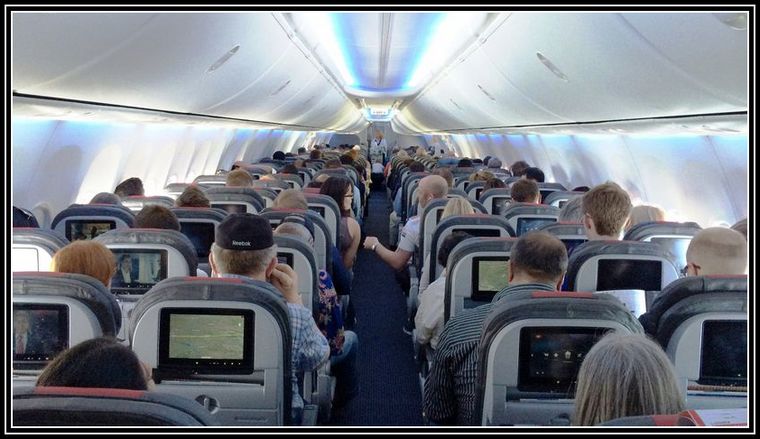
The International Air Transport Association (IATA) announced that the 2022 Cabin Ops Safety Conference (COSC) will take place as an in-person event in Lisbon, Portugal, 14-16 June with TAP Air Portugal as the host airline.
In the face of numerous operational challenges, the airline industry improved its safety performance in several key areas in 2021, compared both to 2020 and to the average of the five years 2017-2021, including reductions in the accident rate and the number of passenger fatalities.
These strong results were achieved as the industry ramped-up operations from the low point of April 2020, while addressing numerous issues, including crew shortages and a sharp rise in unruly passenger events.
"Airlines and their employees have done a superb job over the past two years under extraordinarily difficult circumstances. Now, as COVID-related travel restrictions are eased, flight operations are ramping-up and the focus needs to be on ensuring we maintain the same high levels of safety and efficiency. The Cabin Ops Safety Conference is the forum for cabin safety experts from airlines, regulators, OEMs and suppliers to join together to share insights on the most important cabin safety challenges," said Nick Careen, IATA's Senior Vice President of Operations, Safety and Security.
Sessions will address key topics including:
Unruly passengers
Cabin crew fatigue
Human trafficking
Cabin accessibility issues
Cabin safety investigations
Cabin design
Accessible lavatory design
The event also will feature workshops on turbulence, cabin crew wellbeing and safety management. Additionally, the popular Cabin Safety Exchange will return. This discussion forum provides an opportunity for cabin safety professionals to share insights about the top cabin safety issues and shapes and steers the work of IATA cabin safety agenda in the years to come.
Google Block Ad
IATA AND ACA COLLABORATE ON STANDARD INFLIGHT CATERING AGREEMENT

The International Air Transport Association (IATA), in collaboration with the Airline Catering Association (ACA), have released an updated Standard Inflight Catering Agreement (SICA). The use of the standardized SICA template helps improve the efficiency of inflight catering procurement across the world.
The release of the updated template is the result of an agreement to deepen the collaboration between IATA and ACA. The two organizations will also jointly promote the use of SICA among their members.
"The updated SICA is a significant achievement. Catering requirements are complex and a unique part of an airline's service standard. SICA helps both airlines and caterers manage that complexity efficiently to achieve the results that travellers expect. And the collaboration between IATA and ACA has improved SICA by bringing together the expertise of both ACA and IATA. This was a successful first-time collaboration that we intend to continue and expand," said Nick Careen, IATA Senior Vice President for Operations, Safety, and Security.
"The updated SICA is a significant step that will benefit our respective members. The clarity that it brings to the intricate work needed to produce millions of inflight meals a day will help both airlines and caterers work more efficiently together. And we look forward to creating even more value for both our memberships in future collaborations," said Fabio Gamba, ACA's Director General.
The SICA agreement template is based on industry best practices and will be included in the IATA Airport Handling Manual which contains all the industry-approved policies and best practices to support safe and efficient ground operations above and below the wing and in the ACA's growing library regarding onboard catering. The template is a flexible document that can be tailored to fit local contexts, laws, regulations, customs, and practices, as well as the specific needs established when negotiating the agreement.
BOEING NAMES NORTHERN VIRGINIA OFFICE ITS GLOBAL HEADQUARTERS; ESTABLISHES RESEARCH & TECHNOLOGY HUB

Boeing [NYSE: BA] has announced that its Arlington, Virginia campus just outside Washington, D.C. will serve as the company's global headquarters. The aerospace and defence firm's employees in the region support various corporate functions and specialize in advanced airplane development and autonomous systems. In addition to designating Northern Virginia as its new headquarters, Boeing plans to develop a research & technology hub in the area to harness and attract engineering and technical capabilities.
"We are excited to build on our foundation here in Northern Virginia. The region makes strategic sense for our global headquarters given its proximity to our customers and stakeholders, and its access to world-class engineering and technical talent," said Boeing President and Chief Executive Officer Dave Calhoun.
Boeing will maintain a significant presence at its Chicago location and surrounding region.
"We greatly appreciate our continuing relationships in Chicago and throughout Illinois. We look forward to maintaining a strong presence in the city and the state," said Calhoun.
"We also want to especially thank Governor Youngkin for his partnership, and Senator Warner for his support as we worked through the process."
Over the past two years, Boeing has implemented flexible and virtual solutions that have enabled the company to reduce its office space needs. At its Chicago office, less office space will be required for the employees who will continue to be based there. Boeing will adapt and modernize the workspace to better support future work requirements.
"In today's business environment, we have adopted a flexible work strategy in parts of our company and are taking steps to be more efficient within a reduced footprint. This helps us channel investments toward our critical manufacturing and engineering facilities and training resources," said Calhoun.
As part of its effort to tap into engineering and technology talent across the U.S and around the world, Boeing plans to establish a research and technology hub in Northern Virginia. The hub will focus on developing innovations in the areas of cyber security, autonomous operations, quantum sciences and software and systems engineering.
"The future of Boeing is digital," said Greg Hyslop, Boeing's chief engineer and executive vice president of Engineering, Test and Technology. "Focusing our R&D and talent development in areas that support digital innovation will fuel the introduction of cutting-edge capabilities. This new hub in Northern Virginia will follow the successful implementation of this technology strategy in other regions."
As the nation's largest exporter, Boeing employs more than 140,000 people and is hiring as the commercial market recovers and the company invests in production, innovation and product development. The company's three business units will continue to be based at their current headquarters, which include:
Boeing Commercial Airplanes in Seattle, Wash.
Boeing Global Services in Plano, Texas
Boeing Defence, Space and Security in Arlington, Va.
In addition to the company's operations, Boeing works with more than 12,000 businesses supporting more than one million supplier jobs across the United States, and located in every state. Globally, the company has operations in more than 65 countries.
Google Block Ad
QANTAS ANNOUNCES PROJECT SUNRISE AIRCRAFT ORDER FOR NON-STOP FLIGHTS TO AUSTRALIA
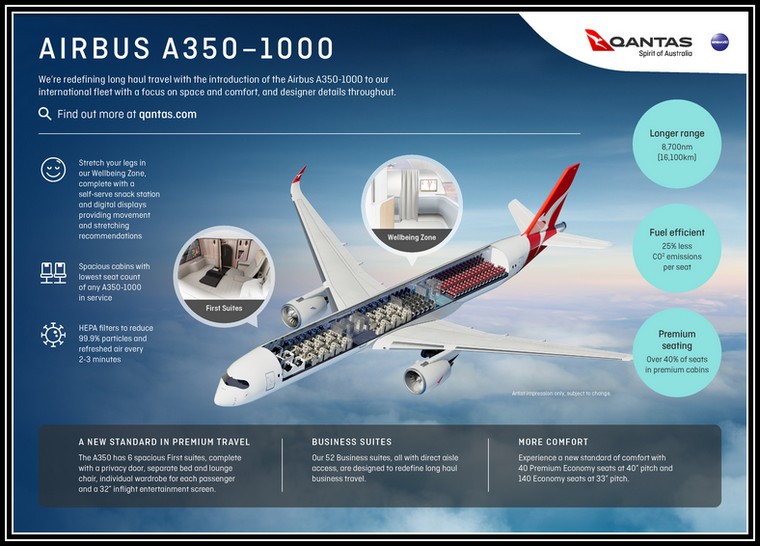
Australia's national carrier has confirmed an order for 12 Airbus A350-1000s to conquer the final frontier of long-haul travel and enable non-stop flights to Australia from any other city including New York and London from late 2025.
Codenamed Project Sunrise for the airline's long history of endurance flying, Qantas has also shared preliminary concepts for its A350 cabin of the future that will offer a new level of comfort for all passengers on these direct flights that will cut up to four hours off total travel time compared with one-stop options today.
Customers onboard Qantas' new fleet of A350 aircraft will be treated to luxurious first-class suites with a separate bed, recliner lounge chair and personal wardrobe; a next-generation business suite; a new premium economy seat pitched at 40 inches, a new economy seat pitched at 33 inches; and a dedicated wellbeing zone designed for movement, stretching and hydration. It has a total seat count of 238, the lowest compared with any other A350-1000 currently in service.
Global travellers can expect more direct routes to Australia, significantly reduced point-to-point travel time and a flying experience second to none - with a cabin interior and service design influenced by medical and scientific research carried out on three Project Sunrise research flights from New York and London to Sydney in 2019.
Qantas Group CEO Alan Joyce said: "For more than 100 years, Qantas has been at the forefront of transforming the way the world travels, particularly through direct flights. Now, the A350 and Project Sunrise will make almost any city in the world just one flight away from Australia. It's the last frontier and the final fix for the tyranny of distance that has traditionally challenged travel to Australia.
"Our direct Perth-London flights started in 2017 and showed strong demand for the convenience and time savings from this kind of travel if the product and service is right. Pre-COVID it was the longest route on our network and had the highest customer satisfaction on our network. All signs point to that demand increasing post-COVID.
"The Qantas A350 travel experience will be truly exceptional, particularly across the premium cabins. Our First and Business Class Seats will set a new benchmark for premium long-haul travel.
"The first Project Sunrise flights will be from New York and London, but the aircraft will also be able to operate non-stop flights to Australia from destinations such as Paris and Frankfurt.
"The Australian national carrier also announced the renewal of its narrow body jets as part of Project Winton with firm orders for 20 Airbus A321XLRs and 20 A220-300s as its Boeing 737s and 717s are gradually retired.
"All of these next generation aircraft - through their lower emissions, longer range, less noise and better economics - will improve how people travel around Australia and overseas."
Project Sunrise will carry 238 passengers across four classes (First, Business, Premium Economy, Economy), with more than 40 per cent of the cabin dedicated to premium seating. The cabin is specially configured for improved comfort on long flights and includes a Wellbeing Zone in the centre and more spacious seating in Premium Economy and Economy cabins. The flights will be carbon neutral, with all emissions offset.
LUFTHANSA GROUP SELECTS NEW 777-8 FREIGHTER, ORDERS ADDITIONAL 787S
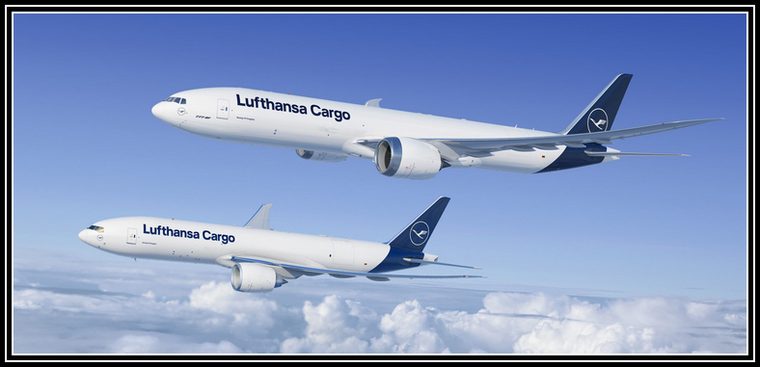
Boeing [NYSE: BA] and the Lufthansa Group has announced the airline group will continue its strategic decision to strengthen Lufthansa Cargo with an order for seven 777-8 Freighters, the industry's newest and most fuel-efficient twin-engine freighter.
The Group has also placed a new order for two 777 Freighters to add to its cargo fleet, providing extra cargo capacity in the near-term until the delivery of its first 777-8 Freighter.
In addition, the Lufthansa Group continues to accelerate the modernization of its long-haul passenger fleet with a new purchase of seven 787-9s. The order for more 787s brings Lufthansa Group's total order book for the 787 Dreamliner to 32 firm orders. The Group also is a launch customer for the 777X passenger airplane, with 20 firm orders.
"The continuous modernisation of Lufthansa Group's long-haul fleet is one of our top priorities. Therefore, we are very pleased to further invest into the newest generation of Boeing aircraft. The purchase will complement our existing orders and further reduce our operating costs, enhance fuel efficiency and provide state-of-the-art customer experiences. Moreover, the purchase highlights our commitment towards enhancing sustainable aviation," said Dr. Detlef Kayser, Member of the Executive Board of Deutsche Lufthansa AG.
Boeing launched the new 777-8 Freighter in January and has already booked 34 firm orders for the model. With advanced technology from the new 777X family and proven performance of the market-leading 777 Freighter, the 777-8 Freighter offers the highest payload and the lowest fuel use, emissions and operating cost per tonne of any large freighter.
"With the selection of our newest freighter, Lufthansa continues its long history of firsts with Boeing airplane programs, becoming the first European customer for the 777-8 Freighter," said Ihssane Mounir, Boeing senior vice president of Commercial Sales and Marketing. "With the investment in the 777 and 787 fleet, the Lufthansa Group will operate the most advanced, fuel-efficient twin-engine airplanes in the industry. Each of these airplanes reduces emissions by 15 to 25% compared to previous models with a noise footprint up to 50% smaller than their predecessors, helping to advance the Lufthansa Group's sustainability objectives."
The 777-8 Freighter is ideally suited for operators creating a more sustainable and profitable future. With nearly identical payload and range capabilities, 30% better fuel efficiency and emissions and 25% better operating costs per tonne, the 777-8 Freighter will be the ideal choice as operators replace aging freighters later this decade.
The 2021 Boeing Commercial Market Outlook projects a 70% increase in the global freighter fleet by 2040, including approximately 450 new large widebody freighters such as the new 777-8 Freighter and 777 Freighter. First delivery of the 777-8 freighter is anticipated in 2027.
Built with lightweight composite materials and powered by advanced engines and a suite of environmentally progressive technologies, the 787 family has an airport-noise footprint that is 60% smaller than the previous generation of airplanes, making it ideal for Lufthansa Group airport communities.
Google Block Ad
UNITED BECOMES FIRST U.S. AIRLINE TO SIGN AGREEMENT TO PURCHASE SUSTAINABLE AVIATION FUEL OVERSEAS
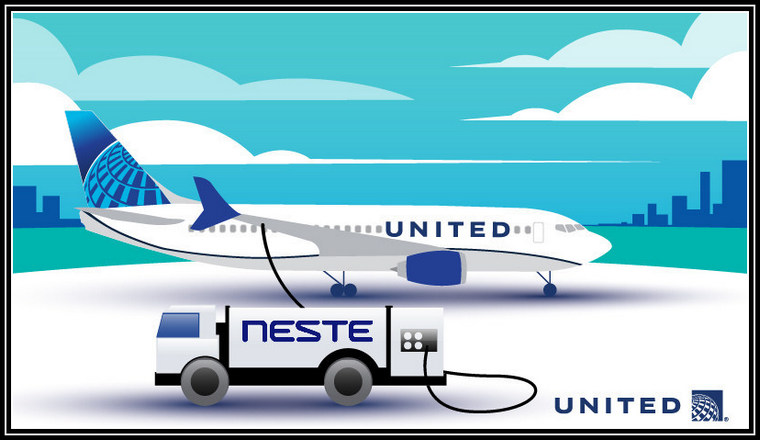
United, which has invested in more sustainable fuel production than any other airline in the world, became the first US airline to sign an international purchase agreement for sustainable aviation fuel (SAF).
The airline has signed a new purchase agreement with Neste that provides United the right to buy up to 52.5 million gallons over the next three years for United flights at Amsterdam's Schiphol Airport, and potentially other airports as well.
"Reducing carbon emissions from fuel is the fastest way United will reach our 100% green goal by 2050. As the airline that has invested more than any other airline in sustainable aviation fuel production, it makes sense to expand our network of partners internationally with a leading company like Neste," said Lauren Riley, United's Chief Sustainability Officer. "The demand from our customers to limit their emissions from flying is growing exponentially, and this agreement means that United customers flying from Amsterdam, and potentially more airports, will be partners in our sustainability efforts."
Neste will provide United with 2.5 million gallons of SAF in Amsterdam in the first year. United will also have the right to purchase up to 20 million gallons in the second year, and up to 30 million gallons in the third year, at Amsterdam or other locations that Neste can supply throughout the globe, as Neste increases its SAF production.
This supply agreement is enabled by Neste's ambitious growth strategy, which will see the company producing 515 million gallons of SAF (1.5 million metric tons) per year by the end of 2023. Neste has been producing and delivering SAF since 2011 and has a proven track record of supplying SAF to customers in Europe, Asia and the Americas.
"We're excited to be partnering with United in this milestone purchase agreement and make our SAF available to United, also an industry leader in SAF investments," said Thorsten Lange, Executive Vice President, Renewable Aviation at Neste. "Our global, fast-growing SAF production and supply chain supports airlines and their customers in reducing greenhouse gas emissions. Neste is committed to helping aviation transition to a more sustainable future, and we look forward to expanding our cooperation with United."
SAF delivers the performance of conventional jet fuel but with a significantly smaller carbon footprint on a lifecycle basis. Neste's SAF reduces lifecycle greenhouse gas emissions ("GHG") by up to 80% compared to conventional jet fuel and burns cleaner than conventional jet fuel reducing non-CO2 emissions, including particulate matter (PM). Neste MY Sustainable Aviation Fuel™ is produced from 100% sustainably sourced renewable waste and residue raw materials, including used cooking oil and animal fat waste.
United has aggressively pursued strategic investments in SAF producers and revolutionary technologies including carbon capture, hydrogen-electric engines, electric regional aircraft, and urban air mobility. United has invested in more SAF production than any other airline globally.
NEW BUSINESS SEAT AND A MORE SUSTAINABLE CATERING OFFER: AIR FRANCE CONTINUES ITS MOVE UPMARKET PROMOTING ELEGANT AND RESPONSIBLE TRAVEL
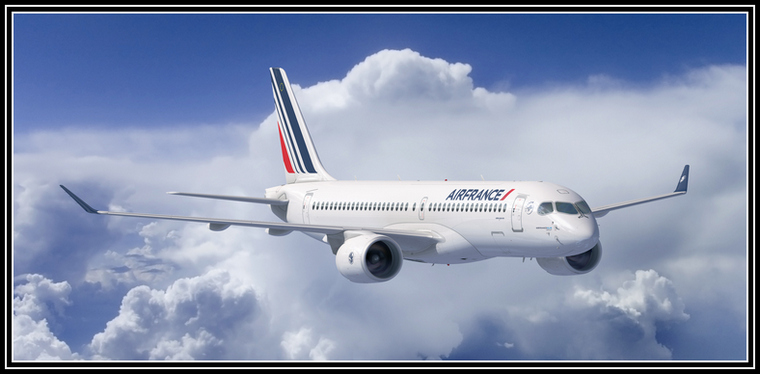
Air France is pursuing its move upmarket and is today unveiling its new long-haul Business seat, elegantly reasserting the French-style art of travel. Constantly evolving to offer the highest level of comfort, the airline's completely redesigned iconic seat features even more enveloping curves and extra comfort.
This seat's design is based on the 3 F's - full flat, meaning that the seat transforms into a real bed almost two metres long, full access, providing all passengers direct access to the aisle, and full privacy, ensuring optimal privacy. A new sliding door allows passengers to create a totally private space, out of sight from the other passengers in the cabin. To create a greater sense of privacy for passengers travelling together, the seats located in the centre of the cabin are now equipped with a central panel that can be lowered by pressing it down, thus creating a convivial space in which to make the most of the flight together. The seat also features a wide 17.3-inch 4K High-Definition anti-glare screen with a noise-reducing headset, a new Bluetooth connection allowing passengers to use their own headphones and several electric sockets.
As you board the aircraft, you are greeted by a backlit winged seahorse, embodying the company's founding myth and rich history. The seat's padding adds softness and a feeling of cosiness. Wool, brushed aluminium, full-grain French leather are the noble, soft and natural materials chosen by Air France for the manufacture of its seats. Each seat is also embroidered with the company's trademark red accent.
Air France is thus introducing a new standard in this travel cabin. Progressively rolled out on 12 Boeing 777-300s as from September 2022, each aircraft will be equipped with 48 seats in Business class.
The company is also installing its latest Premium Economy (48 seats) and Economy (273 seats) seats on board these aircraft for optimum comfort. Each cabin is elegantly decorated in the brand's signature colours: navy blue, white for light and contrast, and hints of red.
Named "Fontainebleau", the first aircraft equipped with these new cabins and a WiFi connection will fly to New York-JFK this autumn.
Premium Economy and Economy, for optimal well-being
In the Premium Economy cabin, Air France is introducing its latest recliner-type seat model already available on its Airbus A350, while further improving its comfort. Each seat offers 96 cm legroom. The seat cushions have been redesigned and the navy-blue herringbone fabric adds further softness. The seat back reclines to 124 degrees and has been widened to provide greater privacy. A new noise-reducing audio headset is integrated into the seat and is easy to use at any time during the flight. The seat also features USB A and C ports.
In the economy cabin, the seats also meet the highest standards of comfort on the market. Each seat has a wide 43 cm seat pan, a 119 degree recline and 79 cm of legroom. The backrest is ergonomically designed, offering reinforced lateral support. It is also equipped with a USB A port.
The seats in these two cabins are equipped with a wide 13.3-inch 4K High-Definition screen with Bluetooth connection, ideal for enjoying over 1,000 hours of on-demand entertainment.
As a delectable interlude during the flight, Air France is committed to offering all its long-haul customers on flights departing from Paris a responsible dining offer with nutritious French produce. In the Business cabin, France's leading Michelin-starred chefs take turns to propose a selection of vegetarian dishes as well as refined meat, poultry and fish dishes. In Premium Economy, customers now enjoy a dedicated meal. In the Premium Economy and Economy cabins, the meals are systematically Nutri-Score A or B-certified.
By the end of 2022, on all flights departing from Paris, the company is committed to offering in all its cabins meat, dairy products and eggs of French origin, fish from sustainable fisheries, the systematic choice of a vegetarian dish and meals that are fully prepared in France. The company will also offer kids and babies' menus made from fully-organic ingredients.
In addition, in its fight against food waste, Air France is also progressively introducing the option for customers to pre-select their hot dish in Business class prior to departure. This service combines the guarantee of customer choice and a more rational consumption. The company is also committed to recycling and eliminating 90% of single-use plastic items on board its aircraft by the beginning of 2023. To achieve this objective, Air France is continuing to develop eco-designed in-flight items that are manufactured from bio-based materials such as bagasse and cellulose. Finally, items that can no longer be used on board are donated to charities.
CATHAY PACIFIC RELEASES TRAFFIC FIGURES FOR MARCH 2022

Cathay Pacific has released its traffic figures for March 2022 that continued to reflect the airline's substantial capacity reductions in response to significantly reduced demand as well as travel restrictions and quarantine requirements in place in Hong Kong and other markets amid the ongoing global COVID-19 pandemic.
Cathay Pacific carried a total of 30,628 passengers last month, an increase of 65.2% compared to March 2021, but a 99% decrease compared to the pre-pandemic level in March 2019. The month's revenue passenger kilometres (RPKs) increased 44.9% year-on-year, but were down 99% versus March 2019. Passenger load factor increased by 24.3 percentage points to 45.6%, while capacity, measured in available seat kilometres (ASKs), decreased by 32.5% year-on-year, and decreased by 98.2% compared with March 2019 levels. In the first three months of 2022, the number of passengers carried increased by 23.5% against a 66.1% decrease in capacity and a 1.2% increase in RPKs, as compared to the same period for 2021.
The airline carried 97,166 tonnes of cargo last month, an increase of 16.6% compared to March 2021, but a 47.5% decrease compared with the same period in 2019. The month's cargo revenue tonne kilometres (RFTKs) decreased 28.4% year-on-year, and were down 65.6% compared to March 2019. The cargo load factor decreased by 4.9 percentage points to 81.5%, while capacity, measured in available cargo tonne kilometres (AFTKs), was down by 24.1% year-on-year, and was down by 71.1% versus March 2019. In the first three months of 2022, the tonnage decreased by 13.8% against a 49.2% drop in capacity and a 50.3% decrease in RFTKs, as compared to the same period for 2021.
Travel
Chief Customer and Commercial Officer Ronald Lam said: "March was yet another very difficult month for our travel business. Passenger flight capacity remained extremely low at just under 2% of pre-COVID-19 levels.
"We relied heavily on ex-Hong Kong traffic throughout March as the bans on transit traffic at Hong Kong International Airport and on flights from nine countries remained in place during the month. We are very pleased that both restrictions were lifted on 1 April. Our first flight after the ban was lifted departed London on 31 March bringing 264 passengers' home to Hong Kong the next day.
"In March, we also had to trim down our passenger flight capacity to the Chinese Mainland, and Shanghai in particular, in response to the city's tightened anti-pandemic measures.
Cargo
"For cargo, our capacity on long-haul routes remained constrained by ongoing aircrew quarantine requirements; however, we were very pleased to have brought Atlanta, Houston and Miami back on line. With reduced long-haul operations, we have used the available aircraft and crew to add capacity to our regional lanes, in particular Northeast Asia and South Asia, where demand has been relatively robust. Overall, our cargo flight capacity has recovered over 40% compared to the lowest point in January, although it remains just 29% of pre-COVID-19 levels.
"On the demand side, tonnage contribution from Hong Kong reduced in March, as cross-border trucking capacity remained constrained, and production in the southern part of the Chinese Mainland was affected due to ongoing anti-pandemic measures.
"Nevertheless, strong transhipment from other markets filled some of this gap, resulting in 49% tonnage growth compared to the previous month. The regional movement of Rapid Antigen Test (RAT) shipments and other medical supplies continued to be active throughout the month.
Outlook
" We welcome the lifting of the transit ban and the place-specific suspension mechanism, the rationalisation of the flight-specific suspension mechanism, as well as the reduction of the mandatory quarantine period for both travellers and aircrew alike in April. However, travel and operational restrictions remain stringent, and we have only been able to achieve a modest increase to our passenger flight capacity.
"We are seeing improved demand for passenger flights and have been trying our best to operate additional services. As always, we will remain agile in order to identify and capitalise on any opportunities should they arise.
"Regarding cargo, we will be operating a similar level of capacity in April as in March due to ongoing operational constraints. Having said that, we are continually looking to increase our long-haul cargo flight capacity where possible and we will resume limited freighter flights to Europe with Frankfurt coming back on line from mid-April.
"Regionally, we expect exports from Shanghai to be significantly reduced in light of the COVID-19 situation there. On the positive side, demand from Hong Kong should slowly recover as cross-border trucking bottlenecks ease, while the feed from other parts of our network remains healthy.
"As Hong Kong's home carrier, we remain resolutely committed to keeping the flow of people and cargo between Hong Kong and the rest of the world safely moving, despite the difficult circumstances presented by COVID-19. Although Cathay Pacific and Hong Kong continue to face many short-term challenges, the opportunities presented by the Greater Bay Area and the growth potential afforded by the opening of the third runway at Hong Kong International Airport will ensure that both our airline and our home hub will be highly competitive when the pandemic-related restrictions are lifted. Our confidence in the long-term future of both Cathay Pacific and the Hong Kong international aviation hub remains as steadfast as ever."
ETIHAD AIRWAYS UNVEILED A NEW SUSTAINABILITY-DRIVEN ECONOMY EXPERIENCE

Etihad Airways, the national airline of the UAE, has unveiled its new Economy class soft furnishings and tableware which will be launched on board in the fourth quarter of the year. The new products have been designed with sustainability and improved guest experience as primary objectives.
The announcement was made on the opening day of the Arabian Travel Market, a trade event for the travel and tourism industry taking place this week in Dubai.
The Economy class experience will be upgraded with new soft furnishings for all guests in Economy, including a 35% larger pillow with a 200 thread-count cotton cover made locally in the UAE. This is complemented by a soft blanket made from recycled plastic for additional comfort on all flights.
Etihad's new dining experience features reusable tableware made from recycled high-quality plastic and eliminates the use of single-use plastic. The tray, serving plates and their lids are part of a closed loop recycling system. At the end of their lifecycle, they are collected, washed, ground and reused to make new replacement products.
Etihad is also introducing quality stainless-steel cutlery into the Economy cabin which upgrades the experience and also reduces single-use plastic.
In 2019, Etihad committed to remove 80% of single-use plastic from its operation by the end of 2022 and the introduction of this new inflight equipment ensures the airline meets this sustainability goal. Where possible, Etihad is also moving towards locally produced items which will further improve the overall environmental impact of the operation.
Terry Daly, Executive Director Guest Experience, Brand and Marketing, commented: "Etihad is trailblazing when it comes to sustainability in aviation. Following extensive research and development through our eco-flights over the past few years, we're proud to reveal the first in a series of enhancements to our inflight experience. Our commitment to sustainability doesn't come at a compromise to the quality and thoughtfulness behind Etihad's guest experience, and these innovative new products will further improve our offering. We look forward to rolling out this new experience across the fleet towards the latter part of the year."
Etihad Economy is renowned for its spacious Economy seating featuring its signature fixed wing headrest which provides optimal support for a restful travel experience. The airline also offers Economy Space seating which provides an additional 4" of legroom for every guest who chooses to upgrade to this option. In addition, Etihad's passengers may choose neighbour-free seating in Economy for an additional fee, which offers extra privacy and comfort.
This new launch follows a notable year for the airline which introduced its new Warner Bros. World™ Abu Dhabi themed children's packs across its fleet in February. This was followed by the unveiling of the new Airbus A350-1000 aircraft which entered into service in March and is the first of five A350-1000's to join the Etihad fleet this year. The A350-1000 features Etihad's new interior cabin design, including the state-of-the-art Economy and Business class seating.
Google Banner Ad

|
                            |























